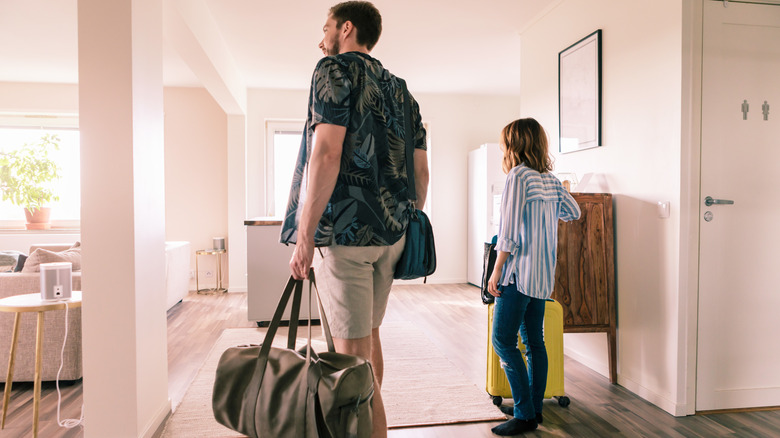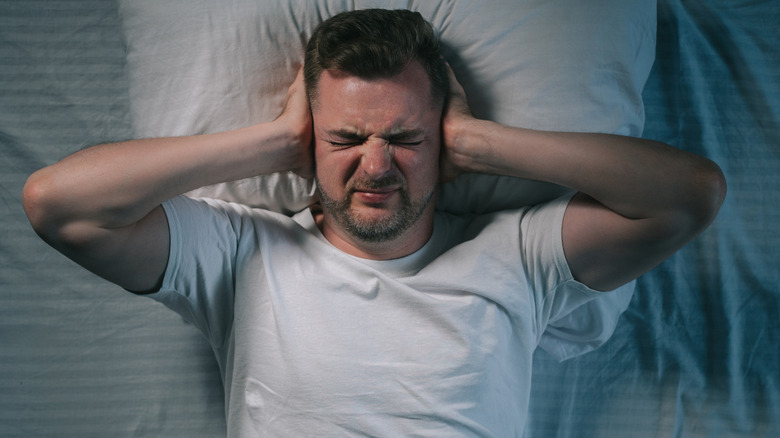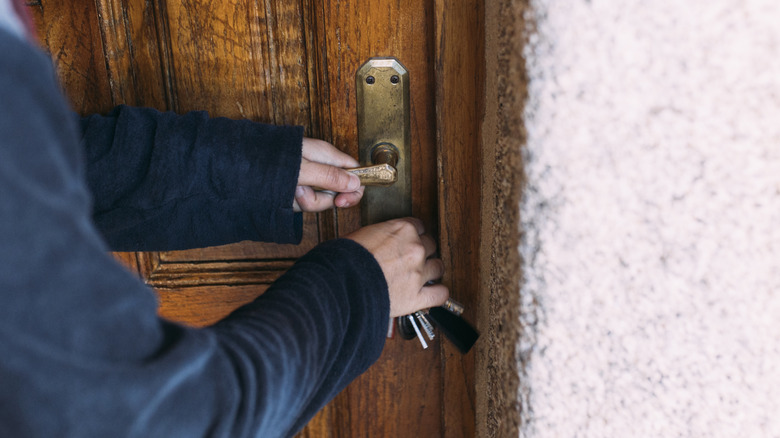Three Important Safety Questions To Ask Your Airbnb Host Before Check-In
Though safety is one of the last things anyone wants to worry about while on a trip, it's arguably one of the first things we all should think about. And while streetside environmental awareness is one thing — not having your phone sticking out of your pocket, rejecting solicitors, not walking down dark alleys at night, etc. — the security of your lodging is another issue entirely. This is especially the case at an Airbnb or Vrbo rental, which by default is just a house or apartment with none of the built-in security features of a hotel.
Vacation rental sites like Airbnb and Vrbo all have a couple handy features to figure out on our own if a property is safe or not. There's customer reviews, which should always be taken with a grain of salt, but can at least point out any glaring concerns. There's also the general location of the listing, which may or may not come with a map with a radius of the area where you'll be staying, but can still be checked for neighborhood safety. And, you should always click on the "Show More" and amenities buttons to see as much information as possible about the listing
But besides these options, you can always ask a host about safety. There are some general vacation rental questions that it's always worth asking, like, "How good is the Wi-Fi?" But when it comes to safety, the very general, "What safety measures are in place?" is a good place to start. That's an open-ended question that'll give the host a chance to respond in a variety of ways. From there, you can dig a bit deeper if you've got specific concerns about some sneaky dangers of Airbnb's, or if you sense a host isn't being forthcoming with information.
Asking about the listing's noise level and neighborhood
Most of the time spent on vacation will be out of your room, except in the evenings or at night. The last thing you want to deal with is a noisy neighbor or area. And even though ambient noise can come from a safely busy, restaurant-filled street, for example, noise could also be an indication that you're in a sketchy part of town.
Reviews can help you figure out noisiness, to a degree. One errant complaint out of 250 in a list of 4.8-star reviews is an obvious outlier and likely due to the guest, not the host or listing. But if you read three to four complaints in a slightly lower-reviewed place, like maybe a 4.4, then that's a pattern worth investigating. You can always ask your host directly, "Is the area noisy?" But it's not likely a host is going to admit anything negative. You could opt for the roundabout, "Have you ever received noise complaints?" If there are noise complaints, it'd also be smart to see if they happened on a certain night of the week, like Friday or Saturday. Also, it'd be wise to check about seasonal goings-on in the area.
You can also ask for details about the neighborhood — what's nearby like bars, how close are windows to the street, how close to other buildings, etc. Some people recommend against straight-up asking if the area is safe because you could come across as hoity-toity. But honestly: Isn't your own safety more important that what a random Airbnb host thinks about you?
Asking if anyone else has access to the property or room
Finally, we come to physical safety along the breaking-and-entering line of concerns. Sometimes, big companies or businesses scoop up multiple apartments and rent them out on Airbnb, like in downtown Prague where 80% of short-term rentals are owned by landlords who own more than one property (per Prague Daily). So it's always better if a rental has a digital code entry rather than a physical key that can be duplicated by other guests.
Also, as many of us can attest, every house has a backup key, so you may wonder who's holding that. This doesn't mean that this person is plotting to break into the listing and steal your stuff. But, that person can also lose their key, which introduces instability into the listing's safety. As a general rule of thumb, the more people who have access to something, the less secure it is.
This is why you should always ask a host, "Does anyone else have access to the property?" This is especially the case if you're traveling alone or traveling in a less safe region or country. You can always be more straightforward and ask, "Does anyone else have a key or access to setting the code?" Like before, your own safety is more important that tip-toeing around the issue. If something happens because you didn't get proper information, gentility won't cut it as a reason why you didn't know the rental wasn't safe.


